Program Analyst Resume Examples: Program Analysts play a pivotal role in various organizations. Their main duty is to analyze and evaluate existing or proposed systems, procedures, and I.T. solutions, thereby improving the operational efficiency of an organization.
Importance of a Well-Crafted Resume for a Program Analyst
In the highly competitive world of program analysis, a resume acts as a strategic marketing tool, positioning you apart from other applicants and presenting your potential value to prospective employers. Here is why a meticulously created resume is indispensable for a Program Analyst:
- First Impressions Matter: In most cases, your resume is your first interaction with a potential employer. A well-structured, clearly written, and visually appealing resume can create a positive first impression, improving your possibility of being called for an interview.
- Showcase Your Skills and Qualifications: A Program Analyst’s work is complex and multifaceted, demanding various technical, analytical, and soft skills. A well-drafted resume allows you to highlight these skills, showcasing your expertise and appropriateness for the role.
- Highlight Relevant Experience: As a Program Analyst, you may know various areas, such as project management, data analysis, or strategic planning. Your resume authorizes you to emphasize the most appropriate knowledge for the role you are applying for, revealing your practical knowledge.
- Quantify Achievements: By quantifying your professional achievements, you can demonstrate the real-world impact of your work. It can create your resume more compelling and provide substantial proof of your qualifications.
- Reflect Your Professionalism: A meticulously crafted resume – free of errors, well-organized, and containing relevant information – reflects your professionalism and attention to detail, traits highly valued in a Program Analyst.
Given a resume’s pivotal role in securing interviews and influencing hiring decisions, investing time and effort into creating a polished and professional resume is crucial for aspiring Program Analysts.
Understanding Job Requirements: Key Skills and Qualifications for a Program Analyst
These requirements usually encompass technical and soft skills and certain educational qualifications.
- Educational Qualifications: A bachelor’s degree in a relevant field like computer science, business administration, finance, or economics is often a minimum requirement for a Program Analyst role. Some organizations might prefer candidates with an MBA or a master’s degree in a related field.
- Technical Skills: Program Analysts should possess a strong technical background. It may contain ability in data analysis, SQL, Python, Excel, and project management software like M.S. Project or Base-camp. Familiarity with Agile methodologies is often a plus.
- Analytical Skills: As a Program Analyst, you will need strong analytical skills to evaluate complex information and make data-driven decisions.
- Communication Skills: Strong written and verbal communication skills are essential. Program Analysts must effectively communicate complex information to non-technical stakeholders.
- Problem-Solving Skills: This role’s ability to solve problems quickly and efficiently is vital. It includes troubleshooting issues, identifying opportunities for improvement, and implementing solutions.
- Organization Skills: Program Analysts often manage multiple projects simultaneously, making organization skills crucial for meeting deadlines and balancing priorities.
Referencing these skills and credentials in your resume can demonstrate to possible employers that you comprehend the role’s demands and possess the capabilities to excel.
Footnotes
- U.S. Bureau of Labor Statistics, Financial Analysts: https://www.bls.gov/ooh/business-and-financial/financial-analysts.htm
- IBM, Skills for a Data Analyst: https://www.ibm.com/topics/data-analysis-skills
Essential Sections of a Program Analyst Resume
Crafting a unique and compelling Program Analyst resume involves more than merely filling in the blanks. It demands strategic thought and careful organization of key sections. Here are the quintessential sections that every Program Analyst resume should incorporate, each with its distinct purpose:
1. Contact Information
It might seem rudimentary, but it is crucial. Include your full name, professional email address, phone number, and LinkedIn profile (if applicable).
2. Resume Objective or Summary
It is a brief statement at the top of your resume, under your contact details. It acts as an elevator pitch, summarizing your professional background, key skills, and job goals. Tailor it to emphasize the qualities most appropriate.
3. Skills Section
A well-crafted skills section can showcase your aptitude for a Program Analyst role. List technical skills (like proficiency in project management tools or data analysis software) and soft skills (like problem-solving or teamwork). Remember, your skills should mirror the needs of the job description as closely as possible.
4. Work Experience
It is the heart of your resume. Include relevant past roles, detailing your duties and accomplishments in each. Use bullet points for clarity and action verbs for impact. Most importantly, quantify your accomplishments, as numbers often resonate more effectively.
5. Education
This section contains your degrees, your organizations, and the graduation dates. Contain any appropriate training.
6. Certifications
If you have any relevant certifications, like Certified Government Financial Manager (CGFM) or Project Management Professional (PMP), ensure to contain them. It can show your dedication to the field and your skilled development.
7. Awards and Honors
Highlight any awards or recognition in this section. They can serve as powerful testimonials of your skills and achievements.
Your Program Analyst resume is a marketing tool designed to sell your skills, knowledge, and capabilities to possible employers. Ensure each section is crafted meticulously and presents you in the best light possible.
Tips for Writing a Compelling Resume Objective or Summary
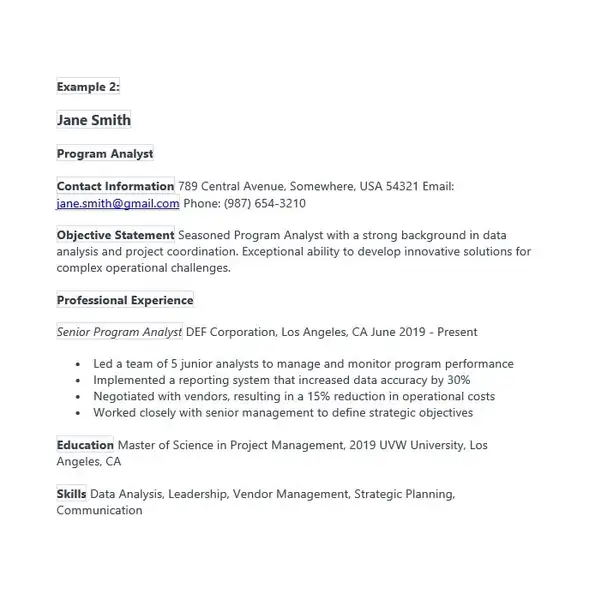
Comprehending how to make this small real estate at the top of your resume count is important. Here are some strategies for creating it:
1. Tailor It to the Job Posting
It means carefully reading the job description and understanding what the employer seeks in a candidate. Confirm that your objective or summary reflects these needs.
2. Highlight Key Skills
As a Program Analyst, these include data analysis, project management, or strategic planning. Be sure to use the same terminology found in the job posting.
3. Demonstrate value
Your objective or resume should contain a statement about how you can add value to the organization. For example, highlight your ability to streamline processes, reduce costs, or improve efficiency.
4. Keep It Concise
While providing details that grab the reader’s awareness is important, keeping your objective or summary concise is equally crucial. Aim for no more than three to four short sentences.
5. Use the First Person, but Exclude Pronouns
Writing your resume objective or summary in the first person but without using personal pronouns is standard practice. For instance, instead of saying, “I have experience in…”, you would say, “Experienced in…”.
6. Proofread Carefully
Finally, be sure to proofread carefully. A single spelling or grammatical mistake can create a poor first impression.
How to Describe Your Program Analyst Experience on a Resume
For instance, instead of saying, “Responsible for data analysis,” you could say, “Analyzed and interpreted complex data from various sources, leading to a 15% decrease in operational inefficiencies.”
Highlighting Key Skills for a Program Analyst on a Resume
A Program Analyst’s skills can be divided into technical and soft skills. Include proficiency in programming languages, software development, and data analysis tools. Soft skills encompass problem-solving, contact, teamwork, and time management. Be sure to include a mix of both in your resume.
The Role of Education and Certifications on a Program Analyst Resume
Your educational qualifications and certifications provide a concrete testament. Highlight relevant degrees, professional certifications, and continuing education courses you have taken that can add value to your role as a Program Analyst.
Structuring Your Resume for Clarity and Impact
Structured in a way that’s easy to read and understand. Use bullet points instead of paragraphs to list your skills and experiences. Prioritize information by placing the most important details first.
Formatting Tips for a Professional Program Analyst Resume
It should be as professional as possible. Use a clean, modern font, maintain consistent formatting throughout, and use a balanced mix of text and white space. Also, provide your resume is free from typos and grammatical errors.
The Use of Action Verbs in a Program Analyst Resume
Action verbs give your resume a sense of energy and accomplishment. Instead of using phrases like “responsible for,” use action verbs like “spearheaded,” “orchestrated,” “innovated,” or “executed.”
Importance of Customizing Your Resume for Every Application
Tailor your resume to each job application to align with the job needs. It offers the employer that you are an excellent fit for the position.
Importance of Customizing Your Resume for Every Application
Tailor your resume to each job application to align with the detailed job needs. It offers the employer that you are an excellent fit for the position.
Do’s and Don’ts for a Program Analyst Resume
Here are some dos and don’ts to consider when creating your Program Analyst resume:
Do’s
- Do Use Action Verbs: Start your bullet points with action verbs like ‘managed,’ ‘analyzed,’ ‘implemented,’ or ‘developed’ to effectively convey your responsibilities and accomplishments.
- Do Quantify Achievements: It can prove your accomplishments substantially and demonstrate your capabilities.
- Do Highlight Key Skills: including technical and soft skills. It could include knowledge of program management software, data analysis abilities, or problem-solving skills.
- Do Keep It Concise: Avoid unnecessary data and aim for clarity and brevity.
- Do Tailor Your Resume: It fits the job you are applying for.
Don’ts
- Do not Use Vague Language: Be specific about your positions, duties, and accomplishments, and avoid generic phrases
- Remember to Proofread: A resume with grammatical errors or typos can give an impression of carelessness.
- Do not Include Personal Information: It needs to be more relevant to your ability to perform the job.
- Do not Lie or Exaggerate: Misrepresenting information can lead to serious consequences.
- Do not Use an Unprofessional Email Address: Use a professional email address that includes your first and last name.
It is a representation of your professional self. Make it count by considering these dos and don’ts as you craft your Program Analyst resume.
Utilizing Resume Templates: Advantages and Considerations
Resume templates can save you time and ensure your resume looks professional. However, make sure to choose one that reflects your industry and role. Also, customize the template to create your resume impressively.
Real-Life Program Analyst Resume Examples
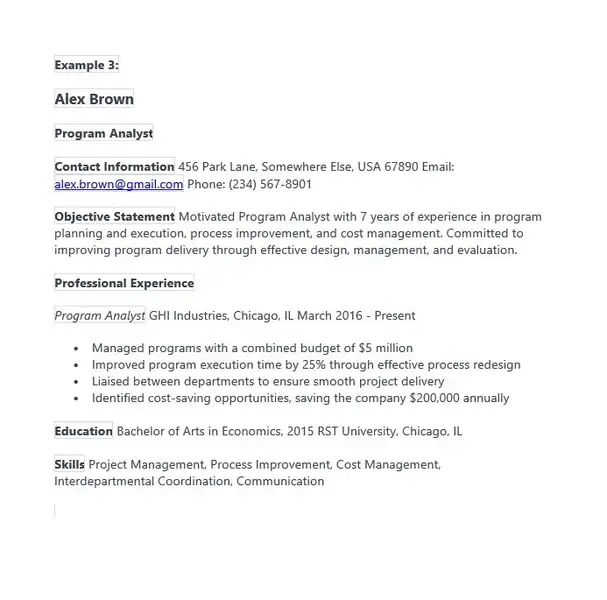
Look for real-life resume examples to get inspiration. These can give you ideas on how to phrase your skills and experiences and what information to include.
Program Analyst Resume Examples
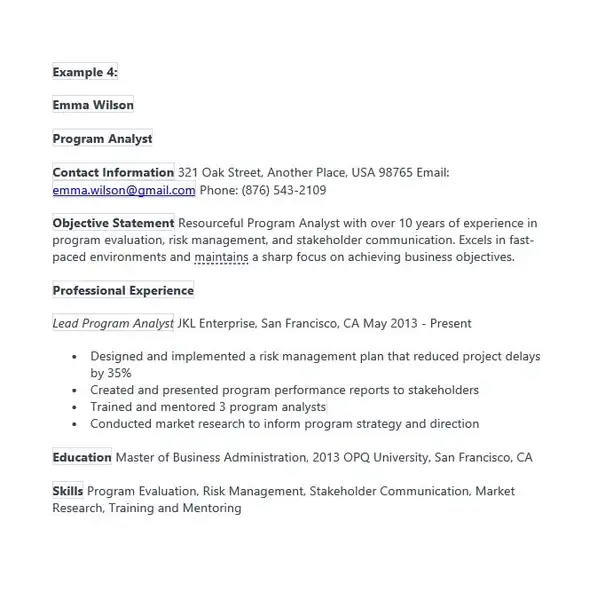
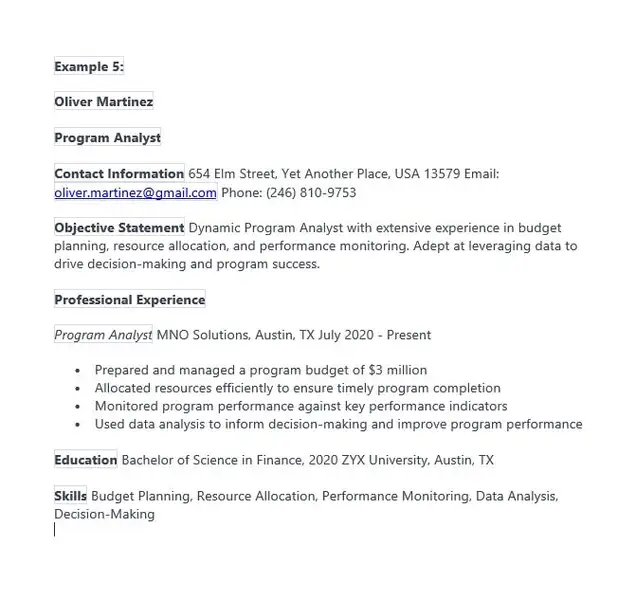
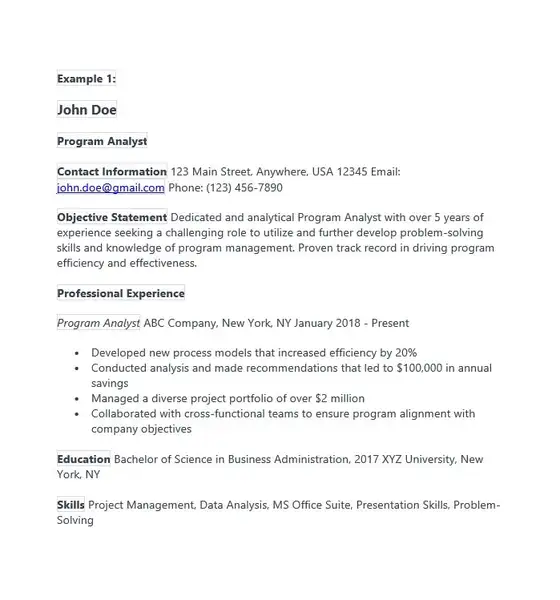
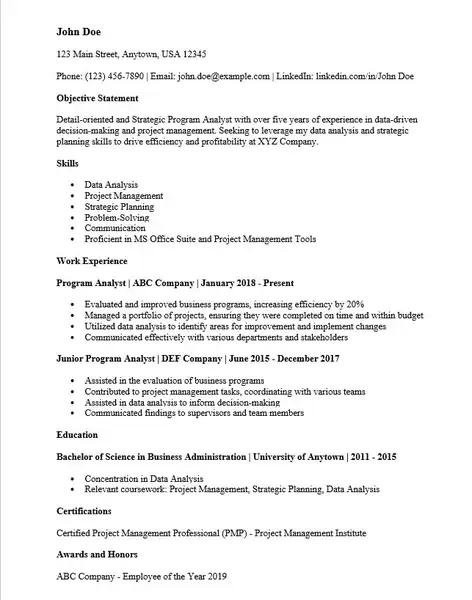
John Doe
123 Main Street, Anytown, USA 12345
Phone: (123) 456-7890 | Email: john.doe@example.com | LinkedIn: linkedin.com/in/johndoe
Objective Statement
Detail-oriented and Strategic Program Analyst with over five years of experience in data-driven decision-making and project management. Seeking to leverage my data analysis and strategic planning skills to drive efficiency and profitability at XYZ Company.
Skills
- Data Analysis
- Project Management
- Strategic Planning
- Problem-Solving
- Communication
- Proficient in MS Office Suite and Project Management Tools
Work Experience
Program Analyst | ABC Company | January 2018 – Present
- Evaluated and improved business programs, increasing efficiency by 20%
- Managed a portfolio of projects, ensuring they were completed on time and within budget
- Utilized data analysis to identify areas for improvement and implement changes
- Communicated effectively with various departments and stakeholders
Junior Program Analyst | DEF Company | June 2015 – December 2017
- Assisted in the evaluation of business programs
- Contributed to project management tasks, coordinating with various teams
- Assisted in data analysis to inform decision-making
- Communicated findings to supervisors and team members
Education
Bachelor of Science in Business Administration | University of Anytown | 2011 – 2015
- Concentration in Data Analysis
- Relevant coursework: Project Management, Strategic Planning, Data Analysis
Certifications
Certified Project Management Professional (PMP) – Project Management Institute
Awards and Honors
ABC Company – Employee of the Year 2019
Common Mistakes on Program Analyst Resumes and How to Avoid Them
Avoiding these common mistakes can enhance the effectiveness of your resume and make a positive impression on potential employers.
- Ignoring Keywords: In the age of Applicant Tracking Systems (ATS), overlooking keywords relevant to the job description can cost you an interview opportunity. Ensure you incorporate industry-specific keywords, technical skills, and terms mentioned in the job description.
- Underselling Achievements: Often, candidates focus on listing duties rather than showcasing achievements. Avoid this by quantifying your accomplishments whenever possible. For example, instead of stating that you “managed a project,” mention that you “successfully led a project team of 10 to complete an initiative under budget and ahead of schedule.”
- Being Too General: Generic resumes rarely stand out. Tailor your resume to each job application, highlighting the skills and experiences most relevant to the role.
- Including Irrelevant Information: Everything on your resume should show why you are the best fit for the job. Omit unrelated job experiences, personal information, and skills not applicable to a Program Analyst role.
- Poor Formatting and Organization: A poorly formatted resume can deter hiring managers from reading it thoroughly. Ensure your resume is well-structured, uses bullet points for readability, and follows a logical order – typically, contact information, summary or objective, skills, work experience, and education.
- Typos and Grammatical Errors: These easily avoidable mistakes can give an impression of carelessness. Always proofread your resume multiple times, and consider using a grammar-checking tool or having someone else review it for errors.
By circumventing these common errors, you can create a compelling, polished, and professional Program Analyst resume that significantly boosts your chances of landing an interview.
Leveraging LinkedIn and Digital Platforms to Supplement Your Resume
In today’s digital age, your online presence can be an extension of your resume. Ensure your LinkedIn profile is updated and mirrors the information on your resume. You can also use digital platforms to showcase your portfolio, projects, or any other work evidence not included in your resume.
Conclusion
Program Analyst Resume Examples – Creating a compelling Program Analyst resume is both an art and a science. It requires strategic thinking, understanding the job requirements, and presenting yourself in the best possible light. With the right approach, your resume can be a powerful tool to help you land your dream job.

The content creator team at calipsotree.com is dedicated to making topics accessible to everyone, with over 9 years of experience in writing and breaking down complex concepts into easy-to-understand articles that answer readers’ financial questions.





